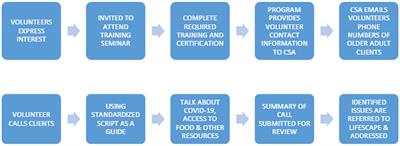EDITORIAL
Published on 06 Feb 2023
Editorial: Technological innovations to address social isolation and loneliness in older adults
doi 10.3389/fpubh.2023.1139266
- 4,145 views
- 2 citations
47k
Total downloads
194k
Total views and downloads
EDITORIAL
Published on 06 Feb 2023
ORIGINAL RESEARCH
Published on 30 May 2022

ORIGINAL RESEARCH
Published on 12 May 2022

ORIGINAL RESEARCH
Published on 29 Mar 2022

ORIGINAL RESEARCH
Published on 14 Mar 2022

REVIEW
Published on 14 Jan 2022

SYSTEMATIC REVIEW
Published on 14 Jan 2022

ORIGINAL RESEARCH
Published on 20 Dec 2021

ORIGINAL RESEARCH
Published on 13 Dec 2021

BRIEF RESEARCH REPORT
Published on 10 Dec 2021

BRIEF RESEARCH REPORT
Published on 09 Dec 2021

COMMUNITY CASE STUDY
Published on 02 Dec 2021
